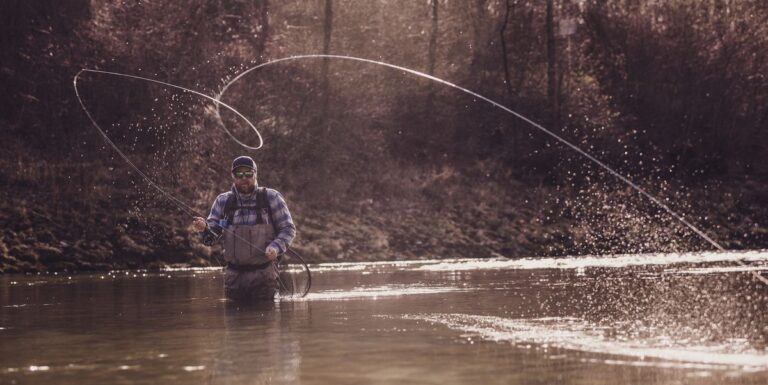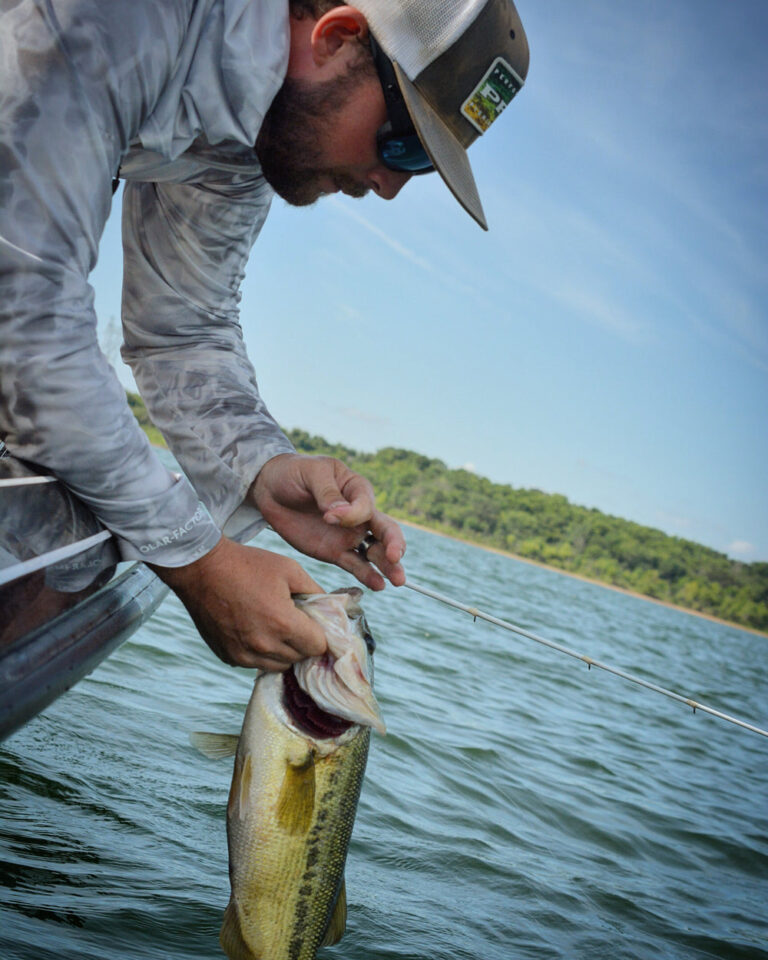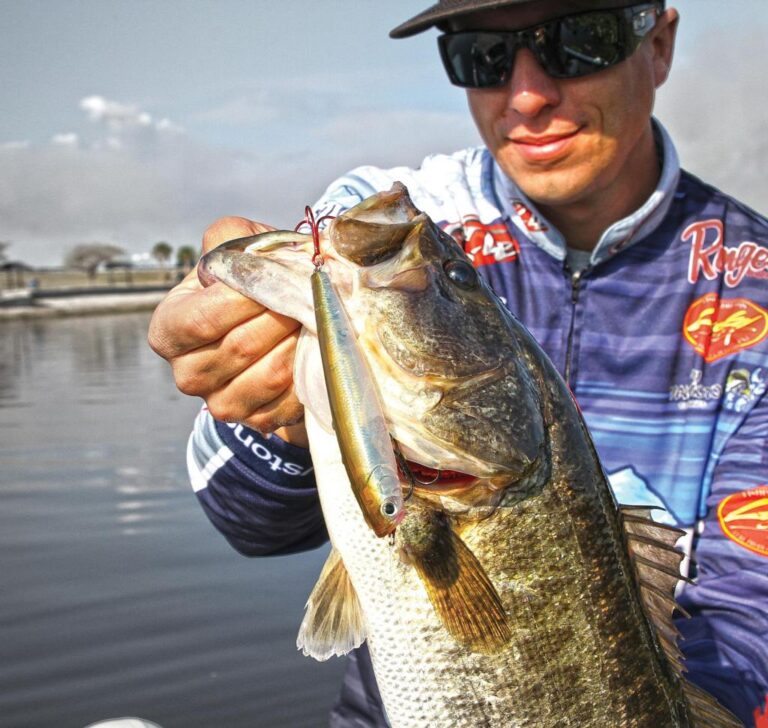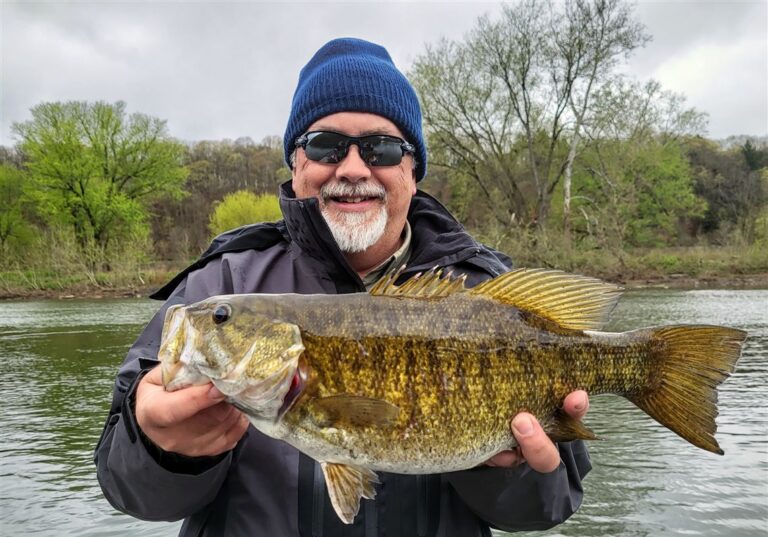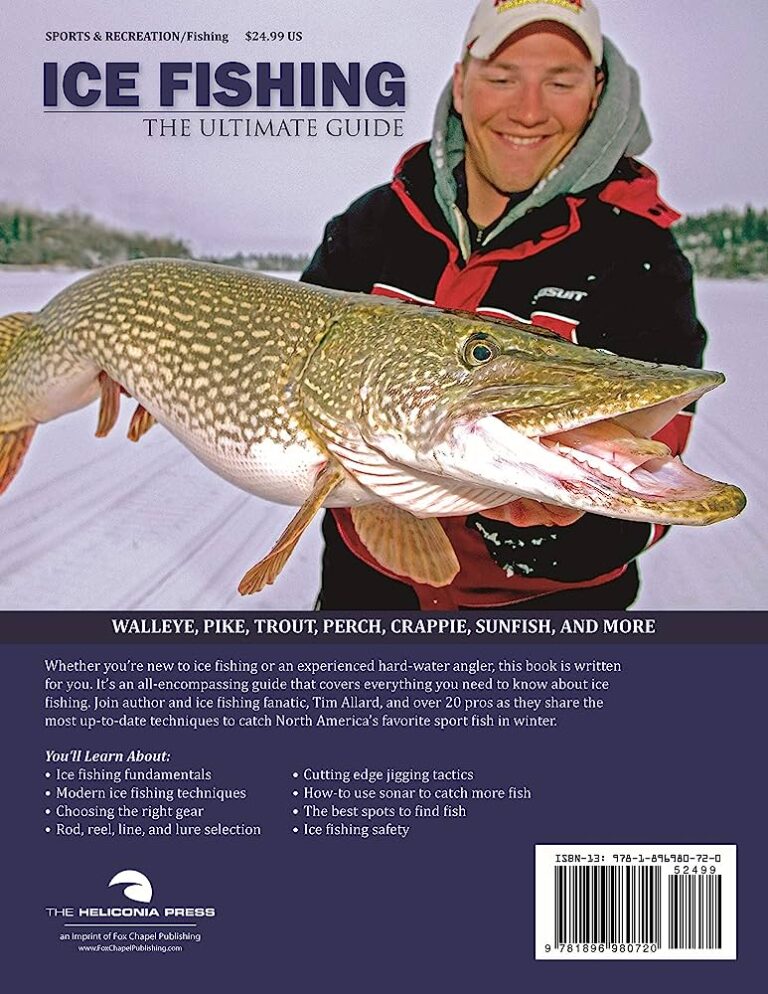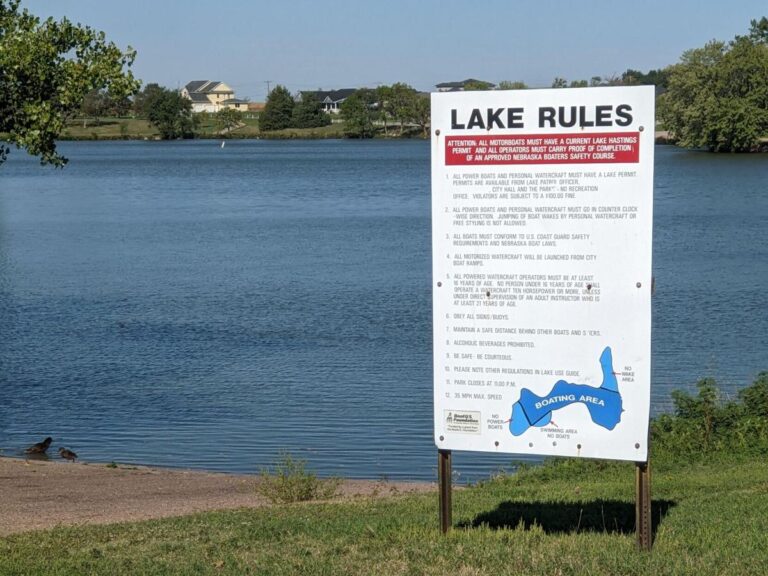Techniques for lake fishing include using the right bait, selecting the correct fishing rod and reel, and understanding the behavior of the fish. Lake fishing can be a great way to spend time outdoors and hook a big catch.
Lake fishing is a popular pastime for many outdoor enthusiasts. Whether you are a seasoned angler or a beginner, the key to a successful catch is understanding the techniques involved. From selecting the right bait to selecting the proper fishing equipment, there are numerous factors to consider when lake fishing.
In this article, we will explore some of the most effective techniques for lake fishing that will help you increase your chances of catching a fish. By the end of this article, you’ll have a better understanding of what it takes to be a successful lake angler.

Credit: www.flyfisherman.com
Why Is Mastering Lake Fishing Techniques Important For Reeling In Big Catches?
Understanding The Nuances Of Lake Fishing
Lake fishing is a popular recreational activity for people who enjoy the relaxation of being near the water. A lake ecosystem is a unique environment to fish, full of intricacies and complexities that can make the difference between catching a fish or not.
Understanding nuances of lake fishing will help you become a more successful fisherman.
Some key points to consider regarding lake fishing are:
- Fish behavior in lakes is dependent on water temperatures, seasons, weather patterns, depths, and nutrients present in water.
- There are different types of lakes, such as natural versus artificial, and each lake type has its own specificities.
- The baits and lures used in lakes can wildly vary from other types of water bodies.
Difference Between Lake Fishing And Other Types Of Fishing
Lake fishing is distinguishable from other types of fishing, mainly based on the geographical feature of the water body. Some differences between lake fishing and other types of fishing are:
- Lake fishing takes place on bodies of standing water such as lakes, ponds, and reservoirs, while river fishing occurs on flowing water bodies such as streams and rivers.
- The water structure of lakes is entirely different from rivers, making the fishing methods and techniques distinct.
- Lakes can be home to various fish species, and finding them requires a different approach than other types of fishing.
Benefits Of Mastering Lake Fishing Techniques
It is essential to have the right strategies and techniques in place when venturing into lake fishing. The benefits of mastering lake fishing techniques are:
- Catching more fish! Lakes can be full of fish if you use proper techniques to lure them.
- Improving overall skills in fishing and building self-confidence as a fisherman.
- Saving time and money – effective lake fishing techniques enable you to plan, minimize errors and costly mistakes.
- Enhancing understanding of aquatic ecosystems and the behavior of different fish species; this makes you a better steward of the environment.
Lake fishing is an activity that requires extensive knowledge and skills. Learning the nuances of lake fishing, the differences from other types of fishing, and mastering lake fishing techniques are vital to giving yourself an edge in catching more fish, improving overall skills, saving time and money, and becoming a better steward of the environment.
Understanding The Basics Of Lake Fishing
Lake fishing is one of the most satisfying outdoor activities for anglers. Before heading to the lake, you must know the basics of lake fishing to make it successful and enjoyable. Here are some essential techniques and guidelines to get you started.
Choosing The Right Time And Place For Lake Fishing
Picking the right time and location for lake fishing is significant because it can influence your catch. Consider the following key points:
- Research the lake and study the weather forecast to choose the best time to go fishing.
- Fish activity is better during the early morning or late evening.
- Look for areas with cover, such as rocks or docks, where fish usually gather.
- Water temperature also plays a crucial role, with colder water resulting in better fishing.
Equipment Needed For Lake Fishing
Having the proper gear is essential for lake fishing. Below are the necessary equipment to get started:
- Fishing rod: Choose a durable fishing rod fit for lake fishing.
- Fishing reel: Choose a reel that is compatible with your rod and suitable for the size of fish you plan to catch.
- Fishing line: Choose a line that has a suitable weight and thickness for lake fishing.
- Fishing hooks: There are various types of hooks you can use, depending on your target fish.
- Weights: Depending on the type of lure and water depth of the lake, you may need to add weight to your line.
- Polarized sunglasses: Essential for reducing glare reflected off the water and allowing you to see beneath the surface.
Bait And Lure Selection
Selecting the right bait and lure is vital to attract the fish you want to catch. Consider the following:
- Live bait: Worms, minnows, and nightcrawlers are common live baits for lake fishing.
- Artificial lures: There are hundreds of types of artificial lures available, such as spinnerbaits, crankbaits, and plastics.
- Consider the color, size, and pattern of the lure, and select the appropriate one depending on the time of day and fishing conditions.
- Different types of fish feed on different types of bait. Research the type of fish in the lake you are fishing and select the appropriate bait and lure combination.
Understanding the basics of lake fishing can give you an advantage when you hit the water. With the right time and location, proper equipment, and bait and lure selection, you are more likely to have a successful fishing trip.
Techniques For Catching Big Fish In A Lake
There’s nothing like the thrill of catching a big fish in a lake. It requires skill, patience, and the right techniques. In this section, we’ll show you how to catch big fish in a lake with ease.
Finding The Right Fishing Spot
Finding the perfect spot to fish is essential to catching big fish in a lake. Here are some tips you can use:
- Look for areas where the water is deeper. Big fish usually swim in deeper waters.
- Check for underwater structure, such as rocks, logs, and weeds. Fish tend to gather around these structures, providing you with better chances of catching them.
- Look for areas with a lot of activity, such as jumps and splashes. It could indicate that there are bigger fish in that area.
Understanding Feeding Habits Of Fish
To catch big fish in a lake, it’s essential to understand what they eat and when they feed. Here are some tips that can help:
- Research the species of fish you want to catch and learn about their feeding habits. It can vary depending on the season, time of day, and water conditions.
- Always use fresh bait or lures that mimic the fish’s natural prey.
- Use a slow and steady retrieve for your bait or lure. Big fish can be more cautious and take longer to strike.
Using The Right Fishing Technique For The Species
Different fish species require different techniques. Here are some tips you can use based on the type of fish you want to catch:
- For largemouth bass, use topwater lures early in the morning and late in the afternoon. They are active during these times and attracted to surface lures.
- For walleye, use a jig or live bait around structures in deep waters. They feed mostly during the day and prefer cooler water temperatures.
- For northern pike, use spoons or spinnerbaits around weed beds and rocky structures. They are aggressive fish and are attracted to fast-moving lures.
By using these techniques, you’ll be able to catch big fish in a lake in no time. Remember to be patient, practice your skills and always be respectful of the environment. Happy fishing!
Advanced Strategies For Reeling In Big Catches
Lake fishing can be an incredible experience, especially when you’re reeling in a big catch. However, it takes more than the basic techniques to catch those larger fish. This is where advanced strategies come into play. In this section, we’ll go over some tips and tricks that experienced anglers use and how you can apply them to increase your chances of reeling in big catches.
Going Beyond The Basics: Tips And Tricks For Experienced Anglers
Experienced anglers know that there’s more to fishing than just casting a line and waiting for a bite. They have developed a set of techniques that can help them catch more fish. Here are some tips and tricks that you can use to take your fishing game to the next level:
- Change your bait regularly: Fish can get used to seeing the same bait repeatedly, making it less effective. Switching things up can help attract more fish.
- Use live bait: Fresh, live bait is more appealing to fish than artificial lures. In addition, it gives off a natural scent that can make your bait more attractive.
- Vary your retrieve speed: Fish can be attracted to different speeds of retrieve, so it’s essential to experiment to figure out what works best for your target species.
- Fish at the right time: Experienced anglers know that certain times of day can be more productive for fishing than others. Early morning and late afternoon are often the best times to fish.
- Pay attention to the weather: Fish can behave differently depending on the weather conditions. Overcast days can be great for fishing, while windy days can make it more challenging.
Applying Advanced Techniques For Larger Fish
When it comes to catching larger fish, you need to be prepared to put in some extra effort. Here are some advanced techniques that can help you catch those sizable catches:
- Use heavier equipment: Larger fish will require sturdier gear. Make sure that you have the appropriate rod, reel, and line to handle the weight of your target species.
- Keep your line tight: When fishing for larger fish, it’s essential to keep your line tight to prevent the fish from escaping. This will require a bit more vigilance and patience.
- Master the art of setting the hook: Setting the hook is essential when fishing for larger species. It’s crucial to time the hookset correctly to ensure that your catch stays on the line.
- Use techniques like jigging or trolling: These techniques require some experience but can be highly effective for catching larger fish. Jigging is a method of moving the bait vertically in the water column, while trolling involves moving the bait horizontally behind the boat.
- Use a fishfinder: A fishfinder can be a helpful tool when fishing for larger species. It can help you locate schools of fish and target the larger ones.
Perfecting Your Fishing Approach
The key to successful fishing is to have a solid approach, regardless of the species you’re targeting. Here are some tips on perfecting your fishing approach:
- Scout the location: Before you start fishing, take some time to scout the area. Look for any underwater structures or features that could be holding fish.
- Be patient: Fishing requires patience, so it’s essential not to rush. Take your time and observe the environment to identify any potential targets.
- Stay alert: Pay attention to any signs of fish activity, such as splashing or jumping. This can give you an idea of where the fish are located.
- Maintain stealth: Fish can be easily spooked by noise or movement, so it’s crucial to keep your approach as quiet and gentle as possible.
- Practice, practice, practice: The more you fish, the better you’ll become. Take every opportunity to improve your skills and experiment with different techniques.
These tips and tricks can help take your fishing game to the next level. Remember, persistence, patience, and practice are the keys to success in lake fishing. Happy fishing!
Deepwater Lakes
Understanding The Unique Characteristics Of Deepwater Lakes
When it comes to deepwater lakes, understanding their unique characteristics can be critical for a successful fishing experience. Here are some key characteristics you should keep in mind:
- Deepwater lakes can be challenging to fish in because of their depth and size, so you need to be prepared for a potentially long and intense fishing experience.
- These lakes have cold water, and fish tend to move around less in these conditions, which means you’ll have to be patient and persistent.
- Fish tend to stay closer to the bottom of deepwater lakes, so you need to have the right equipment and bait to catch them.
Tips For Catching Big Fish In Deepwater Lakes
If you’re looking to catch big fish in deepwater lakes, here are some tips that you can keep in mind:
- Use jigs or drop shot rigs to reach fish that are located at the bottom of the lake. These rigs can help you fish more effectively at deeper depths.
- Use live bait such as worms, leeches, or minnows to attract fish. Remember to attach your bait correctly to avoid losing your catch.
- Study the behavior of fish in these lakes. Some fish will tend to stay in certain areas of the lake at specific times of day, so you need to understand their patterns to increase your chances of catching them.
Equipment And Bait Suggestions For Deepwater Lakes
When it comes to equipment and bait suggestions, here are some options to consider for deepwater lakes:
- Use a sensitive rod, preferably graphite or fiberglass, to help you detect even the slightest bites at the bottom of the lake.
- Consider using a braided line, which is thinner and stronger, to help give you better control over your fishing line.
- Use lures that mimic the baitfish that are naturally found in deepwater lakes, such as crankbaits or swimbaits.
- Lastly, don’t forget to bring a depth finder, which can help you locate fish and hotspots quickly and effectively.
By keeping these tips in mind and arming yourself with the right equipment and bait, you can increase your chances of having a successful fishing experience in deepwater lakes. Happy fishing!
Small Lakes And Ponds
Differences Between Small Lakes And Large Lakes When Fishing
Anglers often encounter differences while fishing in small lakes and large lakes. When it comes to small lakes, the important differences are as follows:
- Small lakes have a limited amount of water, which means that fishing in them requires a different approach compared to large lakes.
- Small lakes have different structures, and their depth and shape can significantly impact your fishing result.
- Small lakes are often concentrated with a variety of structures such as weed beds, flooded timber areas, and shallow flats.
Tips For Catching Big Fish In Small Lakes And Ponds
Catching big fish in small lakes and ponds is every angler’s dream. To achieve this, below are some tips that can help:
- Choose to fish during early morning or evening when the temperature is cooler, and the fish are more active.
- Use live baits such as minnows, worms, or crickets as they are common in small ponds, easy to obtain, and productive.
- Lure the big fish by making use of different colors, sizes, and types of bait. The more active you are in switching and testing different baits, the better the chance of catching big fish.
- Try fishing in the structure areas such as weed beds, drop-offs, and shallow flats.
Best Bait And Equipment For Small Lakes
The right bait and equipment can make fishing productive in small lakes. Here are some of the best bait and equipment options:
- Bait options like worms, jigs, streamers, minnows, and artificial baits are the most productive and effective in small lakes.
- Spinning rods and reels are the best equipment options. Using 6-8 lb test line will suffice in most small lakes as there is no need to worry about the depth or current.
- Bobber, sinkers, and hooks can be live-saving as they can help manage and detect any potential bite.
With these techniques, tackling small lakes and ponds will be a breeze. Remember to take the necessary precautions and keep your equipment in check before going fishing. Happy fishing!
High Mountain Lakes
Unique Challenges Of Fishing In High Mountain Lakes
Fishing in high mountain lakes might be a unique experience for seasoned anglers. Before embarking on your high mountain fishing trip, be aware of the challenges that come with it, such as:
- Thin air: The air in high altitudes is thin, which makes breathing difficult. Make sure to take frequent breaks and bring enough water to stay hydrated.
- Extreme weather: Weather in high mountain areas is unpredictable and can change quickly. Check the weather forecast before heading out and pack appropriate gear for any weather conditions.
- Difficult terrain: The terrain around high mountain lakes can be rocky and uneven, making it challenging to navigate your way to the water’s edge.
- Sparse vegetation: High-elevation locations have fewer trees and plants, making it difficult to find shade during the daytime.
Techniques For Catching Big Fish In High Mountain Lakes
Here are some techniques you can use to increase your chances of catching big fish in high mountain lakes:
- Use float tubes: In high mountain lakes, fish are often found far from the shore. Using a float tube can help you get to those hard-to-reach areas where the big fish might be lurking.
- Cast farther: As fish are wary in high mountain lakes, they need more space to feel secure. The farther your lure travels, the higher your chance of catching a big fish.
- Fish deep: Big fish might be hiding deep in the water column, so adjust your bait accordingly to fish at the right depth.
- Fine-tune your lures: High mountain lake fish are finicky eaters, so be sure to experiment with different lures and vary the speed of your retrieve until you find what works.
Equipment And Bait Selection For High Mountain Lakes
When it comes to selecting your gear and baits for high mountain lakes, consider:
- Lightweight rods: As you might have to trek a long distance to get to the lake, carrying a bulky and heavy rod might be hard work. A lightweight rod would make your journey more convenient.
- Breathable waders: Opt for breathable and waterproof waders that keep you dry, comfortable, and protect you from the cold.
- Best bait and lures: For high mountain lakes, use smaller baits and lures that mimic their natural food. Trout, for example, feed on insects such as midges and mayflies, so try imitating these with your bait.
These techniques and equipment recommendations can enhance your chances of having a memorable high mountain fishing experience. Plan carefully, stay safe, and enjoy the adventure!
Conclusion
Fishing in a lake is a relaxing and engaging activity that requires patience, perseverance, and skill. You need to understand the basics of the fish’s behavior, the environmental factors, the fishing gear, and the techniques. By using effective techniques such as trolling, jigging, and fly fishing, you can increase your chances of catching different species of fish.
Additionally, maintaining a favorable season, weather, and time of the day can also have a significant impact on your success. Remember, fishing is not just about catching fish, it’s about enjoying nature and having a great time with friends and family.
So, whether you’re a seasoned angler or a beginner, embrace and enjoy the experience fully. Happy fishing!

